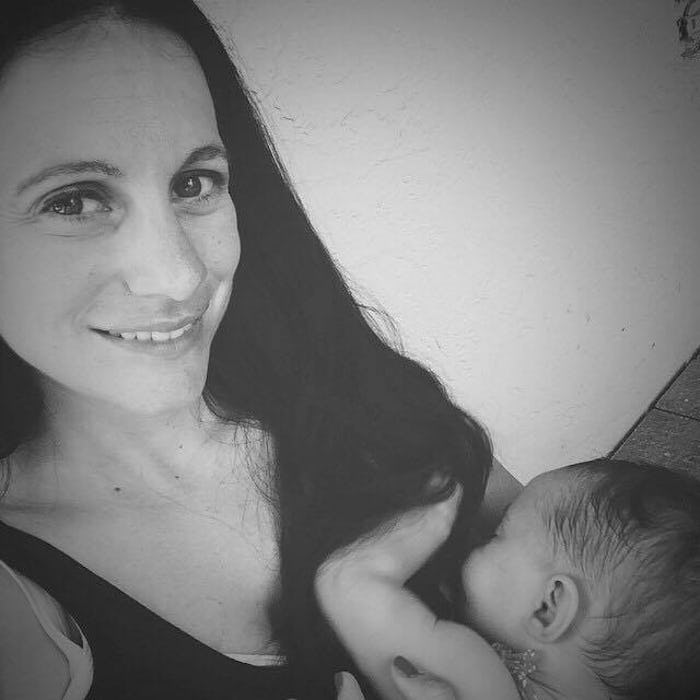Life

Exclusive Breastfeeding Comes With Some Red Flags
Exclusive breastfeeding sounds like something done at a fancy country club for nursing moms. What it actually means is that you only nourish your baby with breast milk, without supplementing with additional food or drink, for the first few months of a baby's life. It is recommended by experts and said to be good for both baby and mom. But, as with anything parenting-related, there are a few exclusive breastfeeding red flags.
The World Health Organization (WHO) and UNICEF recommended that all mothers exclusively breastfeed their babies for the first six months. This means not giving them any infant formula or baby food, WHO even suggests avoiding water. For some moms, this can be a tough recommendation to follow, especially if they are going back to work. But many moms find a way to work and continue to breastfeed exclusively with the help of their handy breast pump.
Typically, breast milk offers babies complete nutrition, and exclusively breastfed babies will grow and develop as expected. However, sometimes, due to a poor latch or health issues with the baby or mother, breastfed babies can struggle to eat and gain enough weight.
Here are some red flags you should keep an eye out for if you are exclusively breastfeeding.
1Your Baby Isn't Latching Well
According to the American Pregnancy Association (APA) your baby has a good latch if you can see their tongue when the bottom lip is pulled down, their ears wiggle, their jaw moves in circular motion, their cheeks are rounded, you can hear swallowing, their chin is touching your breast, and your baby looks satisfied, relaxed, has open hands, and “falls” off the breast or falls asleep when they are done nursing.
If you hear clicking or smacking sounds, your baby sucks on another part of the breast, or your nipples are flattened or misshaped when the baby comes off the breast, these are signs that your baby has a poor latch.
2Your Baby Isn't Dirtying Enough Diapers
Kelly Mom noted that by their fourth day of life and once their mom's milk comes in, babies should be passing at least at least three quarter-sized stools daily and wetting five to six diapers. Your baby's stools should also be yellow by this point, according to Breastfeeding USA. If your baby isn't dirtying enough diapers, it could be a sign that they are not eating enough.
3Your Baby Isn't Gaining Or Is Losing Weight
Babies typically gain an average of about six ounces per week, according to Kelly Mom. Babies who nurse often, but aren't gaining or are losing weight should be taken to a their doctor right away. Healthcare professionals use sensitive digital scales to weigh nursing babies before and after feedings to measure how much breast milk they are consuming.
Mary Unangst, an IBCLC from Sweet Songs Breastfeeding, tells Romper that doctors and lactation consultants can also assess for maternal risk factors that may cause the mom to have a low milk supply, and they perform a suck assessment of baby in order to find the underlying cause of the weight loss. Sometimes, babies who struggle with latching on or sucking, can have a medical condition such as ankyloglossia, also known as "tongue tie" that can be easily corrected through minor surgery.
4You Experience Breast Pain
It's normal to feel some amount of discomfort when breastfeeding, but if you are having severe pain, you could have a condition known as mastitis. According to the Mayo Clinic, mastitis is an infection of the breast tissue that results in breast pain, swelling, warmth and redness and can be accompanied by fever and chills.
5Your Baby Chokes Or Gags While Trying To Nurse
Sometimes, breastfeeding moms have a condition known as oversupply or forceful letdown. This, according to La Leche League International (LLLI), is when the rush of milk from an overfull breast causes a baby to have a difficult time feeding. Babies may not get enough to eat because they can't handle the strong flow and will often choke, sputter, or gag.
6You Have To Take Medication
Baby Center suggested that many medications are compatible with breastfeeding. However, there are some that can be dangerous. Make sure to tell your doctor that you are exclusively breastfeeding before being prescribed or taking any medicines.
7Your Baby Has Foamy Or Watery Stools
Oversupply can cause another problem known as foremilk-hindmilk imbalance. Breastmilk.com mentioned that foremilk-hindmilk imbalance can cause the baby to get full on the foremilk and miss out on the hindmilk which has a higher fat content and helps stimulate your baby’s growth.
Too much foremilk can cause an imbalance of lactose and lactase (the enzyme responsible for breaking down lactose.) Your baby can ingest too much lactose and not have sufficient lactase to digest it. LLLI warned that this can cause stomach discomfort with green watery or foamy stools.